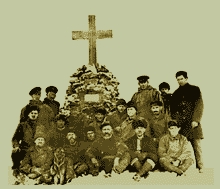- Author
- Taylor, Megan, Midshipman, RAN
- Subjects
- Biographies and personal histories, History - Between the wars
- Tags
-
- RAN Ships
- None noted.
- Publication
- December 2008 edition of the Naval Historical Review (all rights reserved)
Shackleton was respected by his superiors such that the governments of Argentina, New Zealand, Australia and Chile offered assistance to retrieve the men on Elephant Island. His loyalty to Britain at the outbreak of war further heightened public admiration and political support when all resources were placed at the Admiralty’s discretion. A rapid response was received from the First Lord of the Admiralty, Sir Winston Churchill – ‘Proceed’.

Shackleton the Leader
In achieving personal goals, Shackleton failed. Endeavours such as operating his own business fell through, parliamentary aspirations were not realised, his marriage was undermined by a long term affair, and none of his Antarctic expeditions achieved their set goals. However, Shackleton was inspirational, charismatic and compelling, portraying through his bearing, thorough planning and self confidence, the epitome of a successful leader.
Shackleton held qualities essential in a leader, honed through experience, developed during previous expeditions and intelligently applied to situations making him an exceptional leader. His single-mindedness and unwavering focus on the expedition’s mission gained support not only in attracting applications to join his crew, but for funding required to make the adventure possible.
With fifty places available, some 5,000 applications were received, even though the advertisement was blatantly honest. Men were offered an opportunity to join a treacherous endeavour, with little remuneration, possibility of success or chance of return. Perhaps this honesty, accompanying society’s penchant for derring-do in post-Victorian Britain provided the impetus for this response.
Shackleton effectively employed resources, using his knighthood to attract funding, and experience from Scott’s team for self-led expeditions. He also found positives in adverse conditions, trekking towards open sea when Endurance was destroyed, or allowing a liberal meal prior to sailing for Elephant Island (very practical, as boats were overweight and would need to jettison stores).
His dedication and tenacity were never questioned, and any wavering confidence was confined to discussions with Wild and Worsley. Shackleton never lost sight of the mission, even when changed by circumstance, modifying shorter term goals to provide achievement for his crew. He refused to accept defeat, striving constantly for solutions and delivering these as better direction.
He frequently led by example, lending gloves to Frank Hurley, discarding worthless items (such as his cigarette case) in terms of survival, accepting responsibility for his crew’s well-being and stressing their interdependence. He shared positive and negative information, and provided direction towards the ultimate goal. Shackleton undertook, or was capable of, all tasks he asked of his men, and did not hesitate to seek advice from his ‘experts’ thereby showing fallibility and solidarity with his crew.
Shackleton prepared well with ships, stores and crew choices, and in ensuring financial security for his men’s families. He planned for current and future needs, with a portion for contingencies, stocked generic equipment with multiple applications, chose men with a wide skill base, varied experience and appropriate personalities. Throughout the ill-fated expedition examples of his adaptability, lateral thinking and intelligence are prevalent – some of which have been described.
He maintained distance from his crew and was somewhat aloof, keeping a social separation with private quarters emphasising rank, thereby providing tangible leadership that prevented over-familiarity, enabling him to maintain control, and space where he could plan, hold discussions or allow any negatives to be considered without affecting his crew.
Shackleton ensured his men were busied in routines and useful occupations, training novices to improve the overall skill base. He worked with strong personalities giving them increased responsibility, praised achievement, minimised errors and understood human psychological, as well as physical, needs. Shackleton respected his crew, their abilities and the team they created and this was reciprocated. He trusted in these skills and experiences, and in his own decisions, thereby providing cohesion and stability.
Inspirational
Shackleton’s most recognisable trait was that he inspired. Initially, inspiring the public to his quest, his financiers to provide funding, his crew throughout the expedition, the government for permission to continue as planned, and to future visionaries.
‘People do not decide to become extraordinary.
They decide to accomplish extraordinary things.’
Sir Edmund Hillary
Shackleton’s leadership influences not only adventurers, but corporations needing to change direction, and individuals seeking to find paths towards their goals. The 1914–1917 transcontinental crossing of Antarctica is remembered, not as the failure it was, but as the epitome of the achievements of human spirit, as illustrated by the crew’s dedication and unstinting trust, under the exemplary leadership of Shackleton.
Sir Ernest Shackleton embodied the values to which we, New Entry Officers, aspire. His practical examples and leadership reiterate and reinforce the Navy values we embrace: honesty, integrity, loyalty, honour and courage. Nowhere in history are these more obviously demonstrated than by the crew of the Endurance, and Sir Ernest Shackleton – their extraordinary leader.
About the author: Meg Taylor, Midshipman
Melbourne-born, Midshipman Meg Taylor has travelled widely, including five years in the RN. In 1997 this included a visit to South Georgia, the site of Shackleton’s grave, as part of a 7 month Falkland Islands deployment. Currently at HMAS Watson undertaking JWAC, she aims to become a PWO in due course.
